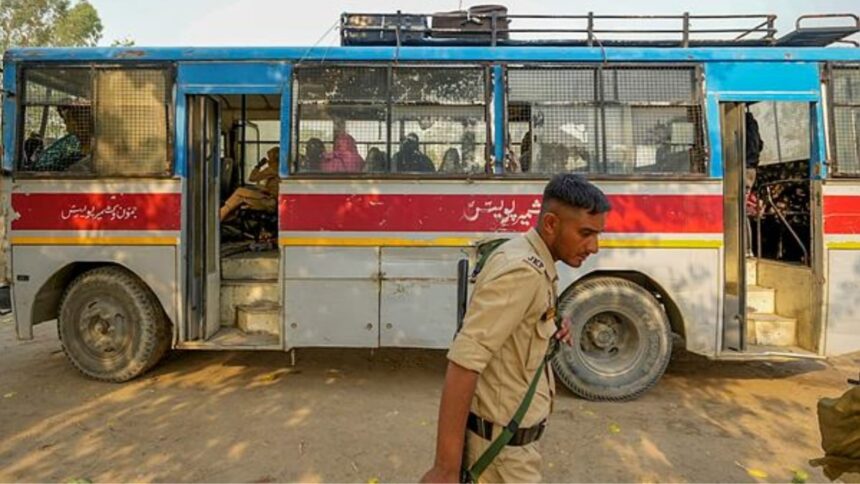On Tuesday, the Jammu and Kashmir High Court gave respite to a serving police constable and his eight siblings, all residents of Salwah in Poonch, against a deportation notice sent to them in the wake of the Pahalgam attack. However, by then, the nine – chased by shadows of displacement during the 1965 war – had been transported to the Attari border in Punjab by the authorities, and their whereabouts are currently not known.
The notice by the Poonch Deputy Commission, dated April 26, had been received by J&K Police Constable Iftkhar Ali, 45; his elder brothers Zulfqar Ali, 49, Mohammad Shafiq, 60, Mohammad Shakoor, 52; and his sisters Shazia Tabsam, 42, Kouser Parveen, 47, Naseem Akhter, 50, Akseer Akhtar, 54, and Nashroon Akhter, 56, on Sunday. This was as per the Centre’s instruction that all residents of Pakistan not holding long-term, official or diplomatic visas leave the country.
On Monday, the police took all the nine into custody and, the same night, drove them to Attari in Punjab for deportation the next morning.
On Tuesday, issuing a notice to the Union of India and the Union Territory administration of J&K, among others, Justice Rahul Bharti directed that the nine petitioners “not be asked or forced to leave UT of & Kashmir”, saying that “prima facie a case is made out” by the revenue papers submitted by their counsel that they are not Pakistani citizens.
Asking the authorities to submit their “objections” to this, Bhati said his direction would be subject to the same.
The High Court also asked the Deputy Commissioner, Poonch, for an affidavit on any property held by the petitioners in their own name, or in reference to their late father Faqur Din in Salwah. The case was listed for next hearing on May 20.
On Wednesday, asked about where the nine were now, Poonch SSP Shafqat Hussain said there was “uncertainty about their whereabouts”.
In their petition, Iftkhar Ali – who as per a PTI report has been serving in the J&K Police for 27 years, and is currently posted at the Katra base camp for the Vaishno Devi shrine – and his siblings said that their father Faqur Din was a ‘hereditary state subject’ (as per the permanent resident certificate which ceased to exist post abrogation of Article 370 in 2019) as well as an Indian citizen as per the 1955 Citizenship Act. They also said he owned about 17 acres of land and a house at Salwah village.
Even at the time of enactment of the J&K Constitution in 1957, he was a permanent resident of J&K, they said.
What put a cloud over their citizenship is that during the 1965 war, Pakistan took over areas along the Line of Control, including where Faqur Din along with his wife Fatima Bi and three of their children were settled. Even after the Tashkent agreement, several families could not return to their native places in view of the war-like situation in their areas. Faqur Din and his family spent a long time at a camp in Tralkhal, PoK, during which time they had six more children.
As per the petition by the siblings, Faqur Din made frequent representations to the Pakistan government for help so as to return to his native village of Salwah.
Local villagers confirm that the family returned between the late 1980s and early 1990s. However, a petition by Faqur Din to the High Court seeking directions that they not be moved out of J&K was rejected, with the observation that the right to citizenship can be decided only by an appropriate authority and that he should approach the Central government.
In 1997, the J&K authorities for the first time issued state subject status, with Iftkhar Ali one of the recipients. His siblings were issued the same in 2000.
However, even as the then state government admitted them as permanent residents, the issue of their nationality remained pending with the Central government. As per their petition to the High Court against their deportation, Iftkhar Ali and his siblings found themselves in further jeopardy when their state subject status was cancelled, reportedly on the basis of “false” and “frivolous” complaints by their relatives, with an eye on their property.
Since then, their counsel said, they had filed various petitions before the court seeking directions to authorities to settle their issue, with a decision still pending.
Former Salwah sarpanch Showkat Ahmed reported emotional scenes at Iftkhar Ali’s house, with the families making passionate appeals to the government to stop their deportation. Iftkhar Ali’s wife said her husband was born here and it was grave injustice to him and his children if their father was deported to a country that he does not belong to.








